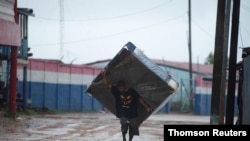Hurricane Iota continued to lash strong winds and rain on northeast Nicaragua on Tuesday after having made landfall late Monday.
Iota weakened from a Category 5 to a Category 4 before making landfall, packing winds of 210 kilometers per hour. Iota is now categorized as a tropical storm as it moves to Honduras, according to the National Hurricane Center, which warned that much of Central America must be prepared for possible mudslides through Thursday.
Many people hunkered down in shelters, while the Nicaraguan government evacuated thousands of residents in low-lying coastal areas ahead of the storm.
One resident in the seaside town of Bilwi, business owner Adán Artola Schultz, told the Associated Press that metal structures banging and buckling in the wind sounded “like bullets.”
Jason Bermudez, a university student from Bilwi, told AP that several houses lost their roofs, with fences and fruit trees knocked down.
“(We) will never forget this year,” Bermudez said.
According to witnesses and Nicaraguan officials, many roofs were blown off buildings and power lines had fallen, with some reported cuts in phone and internet service.
No deaths in Nicaragua were confirmed so far on Tuesday, said Guillermo Gonzalez, head of Nicaragua's disaster management agency SINAPRED.
“The situation is exacerbated by the fact that Iota is making landfall in almost the exact same location that Category 4 Hurricane Eta did a little less than two weeks ago,” the National Hurricane Center said in a statement.
Iota came ashore south of where Hurricane Eta made landfall on November 3, also as a Category 4 storm.
Hurricane Eta killed more than 130 people, as the heavy rains caused flash flooding and landslides over parts of Central America.





